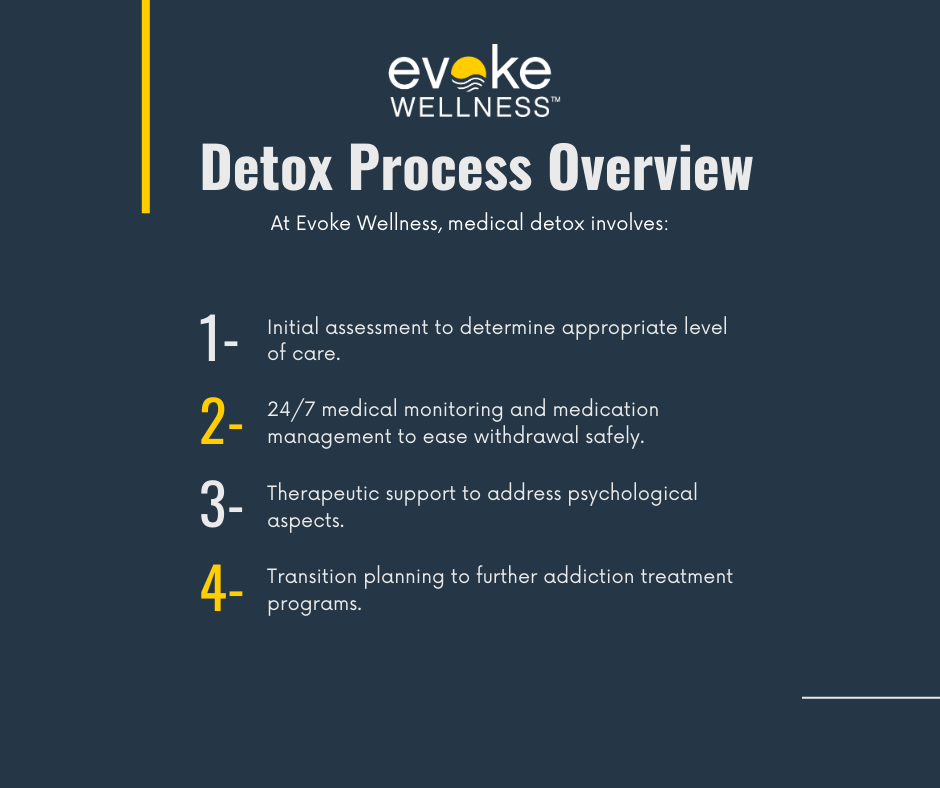Are you struggling with substance abuse and wondering if medical detox is necessary? Recognizing when professional intervention is needed can be challenging, but it’s a crucial step toward recovery. Medical detox provides a safe, supervised environment for managing withdrawal symptoms and preparing for further treatment. Recent studies show that medically assisted detox can significantly improve outcomes, with up to 80% of patients successfully transitioning to residential treatment programs. This article will explore key indicators that suggest you may benefit from medical detox, including the severity of your addiction, potential withdrawal risks, and the presence of co-occurring mental health disorders. Understanding these factors can help you make an informed decision about your path to recovery.
Together, let’s embrace the journey to recovery and the promise of a new beginning. Call us at (833) 819-6066 today or reach out online.
What Is Medical Detox?
Understanding the Process
Medical detox is the first crucial step in recovering from substance abuse and addiction. It involves 24/7 medical supervision to safely manage withdrawal symptoms as substances are eliminated from the body. During this process, medications may be administered to ease discomfort, prevent complications, and stabilize the individual.
Once stabilized through detox, individuals can transition into residential or outpatient treatment programs to continue their recovery journey with therapy, counseling, and other evidence-based services.
When Medical Detox Is Necessary
Medical detox is essential for those who have developed a physical dependence on substances and may experience dangerous or even life-threatening withdrawal symptoms when attempting to quit abruptly.
This often includes individuals with:
- Severe withdrawal effects
- A long history of substance abuse
- Polysubstance abuse (multiple substances)
- Co-occurring mental health disorders
- A history of relapse
Common addictions requiring medical detox include alcohol, opioids (heroin, prescription painkillers), cocaine, methamphetamines, and prescription pills. Quitting these substances cold turkey can trigger seizures, delirium tremens, and other complications.
Comprehensive, Personalized Care
At Evoke Wellness at Miramar, the medical detox process begins with a comprehensive assessment to understand each client’s unique needs. They are then stabilized under 24/7 medical supervision, with therapeutic support to manage cravings and address any co-occurring mental health issues.
After detox, clients can seamlessly transition into Evoke’s residential treatment programs or other levels of care, supported by individualized treatment plans and a range of therapies, including medication-assisted treatment options like Suboxone and Vivitrol.
When Is Medical Detox Necessary?
Physical Dependence & Withdrawal Risks
Medical detox is essential for individuals who have developed a physical dependence on drugs or alcohol. With prolonged substance abuse, the brain adapts and becomes reliant on these substances to function normally. Abruptly stopping use can trigger intense withdrawal symptoms like nausea, tremors, anxiety, and even life-threatening complications like seizures or delirium tremens.
Severe & Poly-Substance Abuse
Those struggling with severe addictions or polysubstance abuse are at higher risk of experiencing dangerous withdrawal effects. Substances that commonly require medical detox include alcohol, opioids (heroin, prescription painkillers), cocaine, methamphetamines, and benzodiazepines due to the potential for severe withdrawal symptoms.
Dual Diagnosis & Relapse Prevention
Individuals with co-occurring mental health disorders, known as dual diagnosis, often benefit from medical detox. This allows for stabilization and management of both the physical and psychological aspects of addiction. Medical detox also reduces relapse risks by providing a controlled, trigger-free environment and medications to curb cravings during this vulnerable phase.
Comprehensive Care & Transition
Beyond managing acute withdrawal, medical detox prepares individuals for comprehensive addiction treatment. With 24/7 supervision, any underlying medical issues can be addressed, laying the foundation for subsequent therapy. After detox, patients can seamlessly transition to residential programs like intensive inpatient or outpatient care to continue their recovery journey.
Acute Detox Symptoms and Timelines
Early Withdrawal Phase
The early withdrawal phase for alcohol, benzodiazepines, and opioids like Dilaudid typically begins within the first 6-48 hours after the last use. During this initial stage, mild symptoms like anxiety, irritability, nausea, headaches, and insomnia can occur as the brain adjusts to the absence of the substance.
Peak Withdrawal
For many individuals, the most severe and dangerous withdrawal symptoms peak 1-3 days into the detox process. Alcohol withdrawal in particular can bring on intense anxiety, tremors, rapid heartbeat, profuse sweating, vomiting, diarrhea, and even life-threatening seizures during this pivotal window.
Benzodiazepine withdrawal also follows a similar timeline. With Valium, the acute phase from days 3-7 is marked by headaches, heart palpitations, tremors, seizures, anxiety, and depression at their most severe levels.
Protracted Withdrawal Phase
Even after the acute detox period, many individuals experience a protracted or post-acute withdrawal syndrome (PAWS) that can persist for weeks, months, or even longer without comprehensive treatment. Lingering alcohol withdrawal effects like insomnia, mood swings, depression, and intense cravings are common.
Similarly, Valium’s PAWS phase brings continued psychological discomfort. And with Dilaudid, post-acute withdrawal symptoms like sleep issues, anxiety, and depression can drag on for several months if not properly addressed through a full continuum of care.
Dual Diagnosis and Co-Occurring Disorders
Understanding Dual Diagnosis
Dual diagnosis refers to the simultaneous presence of a substance use disorder and a mental health condition, such as depression or anxiety. Nearly half of those seeking substance abuse treatment also have a co-occurring mental health disorder, making comprehensive, integrated care crucial.
Common mental health disorders that often fuel substance abuse as a way to cope with symptoms include anxiety disorders, bipolar disorder, and depression. Dual diagnosis programs are designed to treat both the addiction and the co-existing mental health disorder simultaneously.
Co-Occurring Disorders
The broader term “co-occurring disorders” encompasses any combination of mental health, behavioral, and substance abuse issues. Co-occurring rehab involves treating multiple conditions simultaneously, such as an addiction and another behavioral or mental health issue like an eating disorder or trauma.
Individuals dealing with addiction and other mental health disorders or conditions could benefit from a co-occurring rehab program. This type of rehab focuses on addressing all the underlying problems, creating a comprehensive treatment plan.
Integrated Treatment Approach
Effective dual diagnosis and co-occurring disorder treatment programs take a whole-person approach, simultaneously addressing both the addiction and mental health issues through psychotherapy, medication management, counseling, family therapy, and relapse prevention planning.
Evidence-based therapies like cognitive-behavioral therapy (CBT), dialectical behavior therapy (DBT), and trauma-informed care are utilized to address the underlying issues fueling both the addiction and mental health disorder. Treating co-occurring disorders concurrently enhances the chances of achieving and maintaining sobriety.
Signs and Symptoms
Physical, behavioral, and emotional signs that may indicate a co-occurring disorder include withdrawal effects, changes in mood and energy levels, and a spiraling cycle of negative thoughts and substance abuse.
Other potential signs include lying about substance use, cravings, mixing drugs and alcohol, mood swings, lack of interest in activities, and changes in sleep, hygiene, and weight. If these signs are present, seeking professional help for a potential dual diagnosis or co-occurring disorder is crucial.
The Benefits of Residential Treatment Programs
A Supportive Environment
Residential treatment programs provide a safe and supportive environment for individuals to focus on their recovery journey. These immersive settings offer a respite from the triggers and stresses of daily life, allowing patients to dedicate themselves fully to the healing process. With 24/7 care and supervision, individuals receive constant guidance and encouragement as they develop healthy coping mechanisms and build a strong foundation for lasting sobriety.
Comprehensive Care
A key advantage of residential treatment is the comprehensive, integrated approach to addressing both substance abuse and co-occurring mental health disorders. Evidence-based therapies, such as cognitive-behavioral therapy (CBT), dialectical behavior therapy (DBT), and trauma-informed care, are utilized to identify and treat the underlying issues fueling addiction and mental illness simultaneously. This holistic approach enhances the chances of achieving and maintaining long-term recovery.
Personalized Treatment Plans
Residential treatment programs offer individualized care tailored to each person’s unique needs and goals. Through thorough assessments and ongoing progress reviews, treatment plans are customized to address specific challenges, such as severe addiction, co-occurring disorders, or a history of relapse. This personalized approach ensures that individuals receive the focused attention and specialized care necessary for their successful recovery.
Extended Duration
Unlike traditional 30-day programs, extended residential treatment allows individuals to immerse themselves in the recovery process for a more extended period, often ranging from several months to a year. This extended duration provides ample time to address deep-rooted issues, develop essential life skills, and establish a solid foundation for long-term sobriety, reducing the risk of relapse.
Family Involvement
Many residential treatment programs recognize the importance of family support and incorporate family therapy and education into their programs. By involving loved ones in the recovery process, individuals can strengthen their support systems and improve communication, ultimately fostering a more conducive environment for sustained recovery.
With a comprehensive and individualized approach, residential treatment programs offer a promising path to overcoming addiction and co-occurring mental health disorders, empowering individuals to reclaim their lives and achieve lasting well-being.
How do I know if I need Detox? FAQs
Common Signs Detox is Needed
- Experiencing physical withdrawal symptoms like nausea, sweating, tremors, or seizures when stopping substance use. This indicates physical dependence.
- A long history of drug or alcohol abuse, polysubstance addiction, or co-occurring mental health disorders. These increase withdrawal risks.
- Repeatedly relapsing after trying to quit on your own. This shows the need for professional support.
Addictions Requiring Detox
Addictions that commonly require medical detox include:
- Alcohol addiction, due to risks of life-threatening withdrawal symptoms like delirium tremens.
- Opioid addiction, including heroin, fentanyl, and prescription painkillers.
- Stimulant addiction to drugs like cocaine and methamphetamine.
- Benzo addiction to medications like Xanax, Valium, or Klonopin.

Conclusion
Recognizing the need for medical detox is a critical first step toward recovery. By understanding the signs and symptoms of acute withdrawal, you can make an informed decision about seeking professional help. Remember, medical detox is often just the beginning of a comprehensive treatment plan. Following detox, many individuals benefit from residential treatment programs, especially those offering dual diagnosis care for co-occurring mental health disorders. Recent studies show that patients who complete medical detox and transition to residential treatment have significantly higher rates of long-term sobriety. By taking action and reaching out for help, you’re not only safeguarding your immediate health but also investing in a brighter, substance-free future. Don’t hesitate to contact a reputable treatment center to discuss your options and start your journey to recovery today.
Begin Your Journey with Evoke Wellness at Miramar
If you or a loved one is considering treatment, Evoke Wellness at Miramar invites you to contact us. Our compassionate team is ready to answer your questions, discuss your needs, and help you take the first steps toward recovery. In Miramar, you’ll find more than just a treatment program – you’ll discover a community dedicated to your wellness and success. Together, let’s embrace the journey to recovery and the promise of a new beginning. Call us at (833) 819-6066 today or reach out online.


